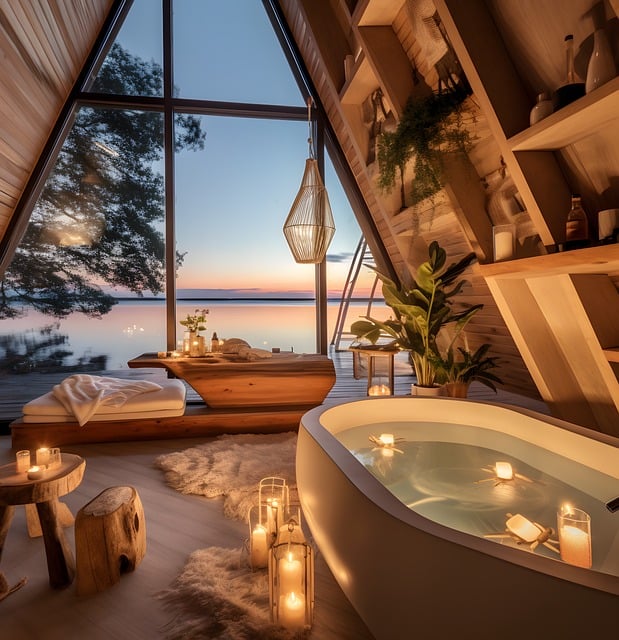Unwind: Discover Holistic Spa Escapes for Total Relaxation & Self-Care
Wellness retreats have gained popularity as a means to escape the daily routine and prioritize self-…….
Wellness Retreats for Self-Care: A Comprehensive Guide
Introduction
In our fast-paced, often stressful lives, the concept of self-care has become increasingly vital for maintaining both physical and mental wellbeing. Among the various approaches to self-care, wellness retreats have emerged as a significant trend, offering individuals the opportunity to step away from daily responsibilities and immerse themselves in an environment dedicated to holistic health. This article delves into the multifaceted world of wellness retreats for self-care, exploring their historical context, global impact, economic considerations, technological advancements, policy frameworks, challenges, successful case studies, and future prospects. Readers will gain a comprehensive understanding of how these retreats can be pivotal in promoting personal health and wellbeing.
Understanding Wellness Retreats for Self-Care
Wellness retreats are structured programs designed to facilitate self-care through a combination of activities, therapies, and experiences that promote physical, mental, and emotional health. These retreats often include elements such as fitness classes, meditation sessions, nutritional guidance, and opportunities for relaxation and reflection. Their core components revolve around stress reduction, personal growth, and the development of healthy habits.
Historically, the concept of a wellness retreat can be traced back to ancient healing practices, where individuals would retreat to natural settings to restore their health. Today, these retreats have evolved into sophisticated and diverse offerings catering to a wide range of preferences and needs, from luxury spa experiences to rigorous fitness boot camps set in serene environments.
Global Impact and Trends
The global impact of wellness retreats for self-care is profound, with an increasing number of people seeking out these experiences as a means of rejuvenation and personal healing. The trend reflects a growing awareness of the importance of mental health and a shift towards more holistic approaches to healthcare. Different regions have adopted these retreats in unique ways, influenced by local cultures, available resources, and wellness philosophies. For instance, Asian countries often integrate traditional healing practices such as Ayurveda and acupuncture into their retreat offerings, while Western retreats may focus more on modern fitness trends and wellness technologies.
Economic Considerations
The economic aspects of wellness retreats for self-care are multifaceted. These retreats contribute to the economies of local communities by creating jobs, stimulating tourism, and promoting sustainable practices. Market dynamics show a growing demand for these services, with an increase in investments reflecting the potential profitability and societal benefits of wellness tourism. The retreats themselves can be significant economic players, offering a range of price points to cater to different socioeconomic groups, thus making self-care a more accessible option for many.
Technological Advancements
Technology has become an integral part of the wellness retreat experience. From virtual reality meditation sessions that transport users to tranquil environments to wearable devices that monitor health metrics, technology enhances the effectiveness and personalization of self-care programs. The integration of telehealth services and online platforms for virtual retreats has also expanded accessibility to these transformative experiences. Looking ahead, advancements in AI and machine learning could further revolutionize how wellness retreats are designed and delivered.
Policy and Regulation
The policies and regulations governing wellness retreats vary by region but generally aim to ensure the safety, efficacy, and ethical delivery of self-care services. Legislation around health and wellness practices, data protection for digital health services, and consumer rights are critical in shaping the industry’s future. Compliance with these frameworks is essential for retreat operators to maintain credibility and trust among participants.
Challenges and Criticisms
Wellness retreats face several challenges, including skepticism regarding their efficacy, concerns over commercialization leading to a loss of authenticity, and the need for more rigorous research to validate their health claims. Additionally, ensuring diversity and inclusivity in these programs is crucial to address the varying needs of different populations. Addressing these issues requires a commitment to ethical practices, evidence-based programming, and ongoing dialogue with consumers and industry experts.
Case Studies
Several wellness retreats have set precedents for successful self-care experiences. A notable case study is the “Transformative Triathlon Training” program, which combines intensive physical training with mental resilience coaching, resulting in improved overall wellbeing for participants. Another example is the “Mindful Mountain Retreat,” which has seen significant success by integrating traditional meditation practices with outdoor adventure activities. These case studies provide valuable insights into how wellness retreats can be structured to maximize their benefits.
Future Prospects
The future of wellness retreats for self-care is bright, with potential growth areas including personalized health and wellness programs, a deeper integration of digital technologies, and an expansion of offerings to cater to diverse populations. Emerging trends such as the rise of ‘micro-retreats’ and the incorporation of neuroscience into wellness practices suggest a dynamic and evolving industry. As society continues to place greater emphasis on mental health and holistic living, wellness retreats will likely play an increasingly important role in promoting personal wellbeing.
In conclusion, wellness retreats for self-care are a testament to the evolving landscape of healthcare and personal development. They offer a multifaceted approach to wellbeing that addresses both physical and mental health needs. Through careful consideration of economic, technological, policy, and social factors, these retreats can continue to serve as vital resources for individuals seeking to improve their lives and wellbeing.

Wellness retreats have gained popularity as a means to escape the daily routine and prioritize self-…….

Unwinding Through Mindfulness offers luxurious wellness retreats focused on holistic inner transform…….

Wellness retreats for self-care, incorporating holistic practices like yoga retreats, meditation ret…….

Wellness retreats for self-care offer diverse experiences catering to various preferences, from yoga…….

Wellness retreats provide immersive experiences tailored to various self-care preferences, from holi…….

Wellness retreats focusing on yoga, meditation, and holistic practices offer transformative breaks f…….

For tranquility and personal growth, visitors should seek remote locations with natural beauty like…….

Wellness retreats, from holistic yoga and meditation centers to luxurious spa escapes, offer transfo…….

Wellness retreats for self-care and holistic retreats provide much-needed breaks from daily life, of…….

Personalized wellness plans, often facilitated through retreats, offer immersive experiences tailore…….